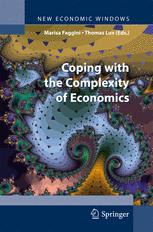

Most ebook files are in PDF format, so you can easily read them using various software such as Foxit Reader or directly on the Google Chrome browser.
Some ebook files are released by publishers in other formats such as .awz, .mobi, .epub, .fb2, etc. You may need to install specific software to read these formats on mobile/PC, such as Calibre.
Please read the tutorial at this link: https://ebookbell.com/faq
We offer FREE conversion to the popular formats you request; however, this may take some time. Therefore, right after payment, please email us, and we will try to provide the service as quickly as possible.
For some exceptional file formats or broken links (if any), please refrain from opening any disputes. Instead, email us first, and we will try to assist within a maximum of 6 hours.
EbookBell Team

4.1
90 reviewsThe purpose of the science of complexity is to provide, if not a unified approach, at least useful tools to tackling complex problems in various scientific domains. Generally, complexity is considered a fundamental challenge to the reductionist approach in science as a whole and to its ideas of certainty and randomness.
The overall behaviour of a complex system is different from and more than the sum of its parts. The behaviour of non-linear complex systems depends on the interaction (often with retroactive effects) among its constituent parts and not so much (or not only) on the characteristics of these parts themselves; the sum of the behaviour of single parts does not necessarily provide us with an explanation of the aggregate behaviour of a system.
All this is true for economic systems. These are based on the activities of single economic agents. Each individual can obtain only partial knowledge that is focussed around its "world" (local information) and react to external shocks in different ways (local rationality).
The aim of this book is to provide an overview to recent developments in theory and empirical research that view economic systems as complex phenomena whose aggregate dynamics can often not be inferred from its microscopic (microeconomic) building blocks. The collection of papers represented in this volume is dedicated to the memory of Massimo Salzano, who has been a fervent and eloquent advocate of the complexity approach.
The contributions have been presented at a conference held to celebrate Massimo’s 60th birthday (Ecople -Economics: From Tradition of Complexity, Capri, 2-4 June, 2006), one year before he unexpectedly passed away in 2007.